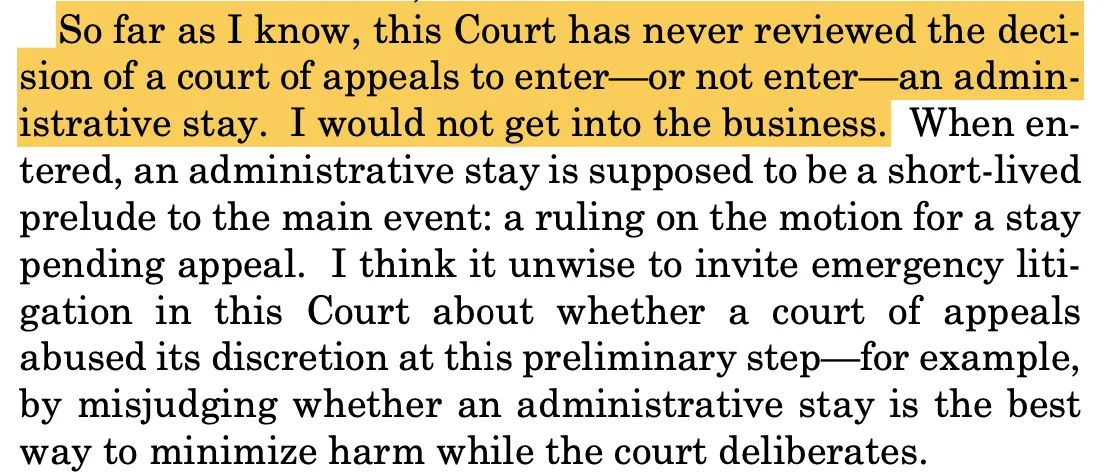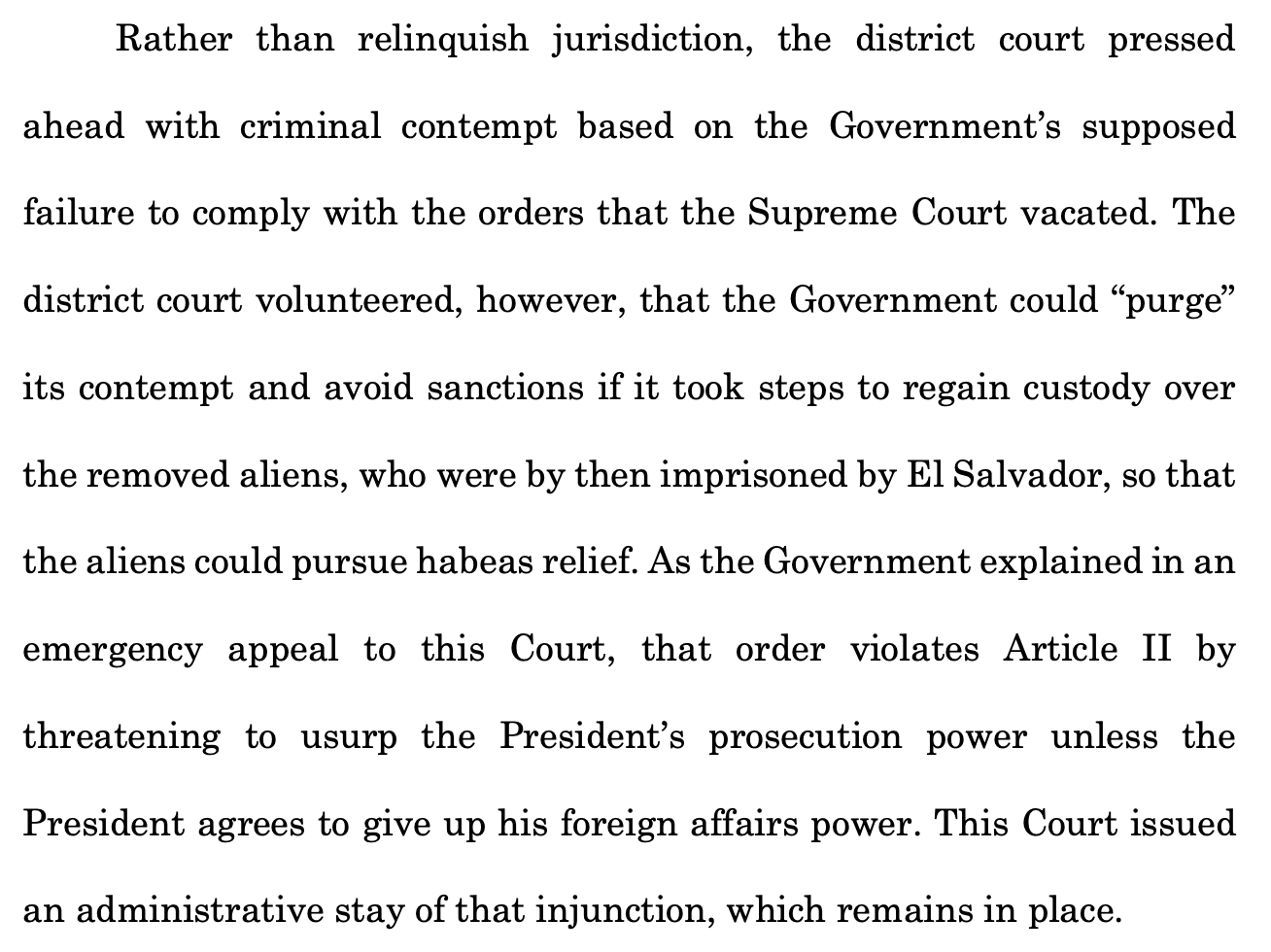D.C. Circuit's Trump appointees issue another administrative stay to block justice
DOJ exploited the "administrative stay" regime that Justice Amy Coney Barrett set into overdrive last year in its effort to keep those sent to CECOT in limbo.
On Tuesday evening, the three Trump appointees on the U.S. Court of Appeals for the D.C. Circuit issued an “administrative stay” blocking a Wednesday deadline the Justice Department faced to explain how it is going to provide constitutionally required due process to the people it unconstitutionally sent to El Salvador’s CECOT prison in March with no such process.
Yes, this is an “administrative stay,” and the order tells us all that it “should not be construed in any way as a ruling on the merits,” but — and in part because of that — this is an extremely concerning development. Let me explain why.
The Justice Department exploited the “administrative stay” regime that Justice Amy Coney Barrett set into overdrive last year — along with the D.C. Circuit’s “special panel” system — to virtually guarantee Tuesday’s order. And, what’s more concerning, that special panel of the D.C. Circuit — Judges Gregory Katsas, Neomi Rao, and Justin Walker — went along with it.
On June 4, Chief Judge James Boasberg of the district court in D.C. issued his opinion and order in the case challenging the administration’s actions sending people out of the U.S. on March 15 to CECOT under the purported authority of President Donald Trump’s Alien Enemies Act proclamation. He found that the Trump administration failed to give those people the very process that the Supreme Court has said anyone being deported under the AEA has — a right to actually challenge their AEA deportation in a habeas action — and accordingly gave the Trump administration until June 11 to provide him with their plan to “facilitate the ability of the CECOT Class to seek habeas relief.”
The Justice Department took no public action in the case on June 5, June 6, June 7, June 8, or June 9.
They filed nothing throughout those five days.
Then, on Tuesday morning, June 10 — one day before the deadline — the Justice Department filed a Notice of Appeal at the district court.1
At nearly 2:30 p.m., DOJ “concurrently” asked the district court and D.C. Circuit for a stay of Boasberg’s ruling. (For what it’s worth, it looks to me like they actually filed in the D.C. Circuit first.) In the D.C. Circuit filing, this is why DOJ justifies this action:
Of course, DOJ doesn’t explain why it was silent on June 5, June 6, June 7, June 8, and June 9.
When it wants to do so, DOJ has filed notices of appeal the same day as a ruling has been issued. Here, though, DOJ lawyers chose to wait.
This is where Barrett comes in.
Fourteen months ago, Barrett wrote a statement concurring in the Supreme Court’s decision denying the request from immigrant groups to vacate the administrative stay issued by the U.S. Court of Appeals for the Fifth Circuit in the group’s challenge to Texas’s S.B. 4 immigration law.
I know, that’s a ridiculous sentence. The groups had won an injunction from the district court before the law went into effect, so the administrative stay would allow the law to go into effect for the first time.
In explaining her vote not disturbing the administrative stay, Barrett wrote that “the Fifth Circuit has not entered a stay pending appeal. Instead, in an exercise of its docket-management authority, it issued a temporary administrative stay ….”
She was joined in this statement by Justice Brett Kavanaugh. She continued, “Administrative stays do not typically reflect the court’s consideration of the merits of the stay application. Rather, they ‘freeze legal proceedings until the court can rule on a party’s request for expedited relief.’” In short, she wrote, “an administrative stay buys the court time to deliberate.”
Then, Barrett — with Kavanaugh — laid down a marker that lower courts have seen as a go-ahead flag:
Barrett did not leave this open-ended, later writing that “[a]n administrative stay should last no longer than necessary to make an intelligent decision on the motion for a stay pending appeal.” She also warned that an administrative stay could be left in place so long that the Supreme Court would be “forced to conclude that an administrative stay has effectively become a stay pending appeal and review it accordingly.“ Even that, though — her use of “forced” — suggested that a lower court would really have to abuse this grant of power before she would need to take it back.
In short, two of the key votes on the court, while not issuing a majority opinion, issued an opinion that would almost always control decisions in requests for reviews of administrative stays. It is a statement that they do not want shadow docket requests about administrative stays. Now, I get her perspective, I really do. But, lower courts did what lower courts do — take authority given to them by the Supreme Court and run with it.
In the past 14 months, Barrett’s concurrence has been cited constantly by lower courts in their issuances of administrative stays.
Which brings us back to the D.C. Circuit.
The D.C. Circuit loves administrative stays. One need look no further than DOJ’s brief on Thursday seeking a stay pending appeal and an administrative stay to see how this is working out in practice.
In its criticism of the district court, the Justice Department lawyers — Yaakov M. Roth, Acting Assistant Attorney General, Civil Division; Drew C. Ensign, Deputy Assistant Attorney General, Office of Immigration Litigation; Tiberius T. Davis, Counsel to the Assistant Attorney General; and Anthony Nicastro, Acting Director, Office of Immigration Litigation — wrote regarding the district court’s decision to pursue contempt proceedings in relation to the March 15 AEA flights:
That “administrative stay” was issued April 18 — more than 50 days ago — by Katsas and Rao, and Boasberg’s effort to move forward with contempt proceedings has been on hold that entire time.
With that in mind, and with the knowledge that this month’s “special panel” of the D.C. Circuit is made up of the three Trump appointees to the court, DOJ waited for six days to do anything after Boasberg issued his ruling as to the class of people sent to CECOT on those flights.
Even then, and on the day before their deadline, DOJ didn’t go to the district court for a stay first — the normal procedure — they, at most, went to the district court and D.C. Circuit “concurrently.”
And they got an administrative stay from the D.C. Circuit less than five hours later.
This is not the biggest story today, but it is an important one because this is another data point marking how the legal system — how the judicial branch — is operating in this moment of increasing authoritarianism from Trump and those he has empowered.
First, the administrative stay granted on Tuesday was issued regarding litigation over actions taken on March 15 and 16. (As was the April 18 administrative stay.) The courts are moving slowly — sometimes, it appears, intentionally — even as the Trump administration is moving more quickly by the day.
Second, this “administrative stay” was issued in an appeal in which the Justice Department is arguing that if the Trump administration can successfully send a person to a foreign prison in a secret arrangement with a foreign government, then any court order seeking due process for such a person is “incoherent and impermissible.“
As a result of this administrative stay, the people sent to CECOT without due process on March 15 will be waiting longer. They will be waiting at least another week and a half before their lawyers even find out if the D.C. Circuit panel is going to make those people wait yet longer still to get the process that the Supreme Court unanimously held on April 7 was due to anyone being removed under the AEA.
And, in the meantime, the Trump administration has sent Marines to California and reportedly is planning on sending thousands of migrants to Guantanamo Bay.
The first notice had an error — they used the wrong case number — so they had to file it twice.








It seems like the odds of getting three R dominated panels in a row, on a 7-4 D court, should be infinitesimal. I’m getting very suspicious. We’ve had Rao Katsas Henderson (all R), R K Pillard (D) and now R K Walker (again all R). WTF???
Maybe the whole "You've clearly violated the law multiple times...but before I punish those violations, I'm gonna count to 5 reeeaaaallly slooooooowwwwly" thing was a bad idea! The average citizen who causes this much harm to the people around them don't usually get such a chance to avoid consequences, neither should the DoJ attorneys.